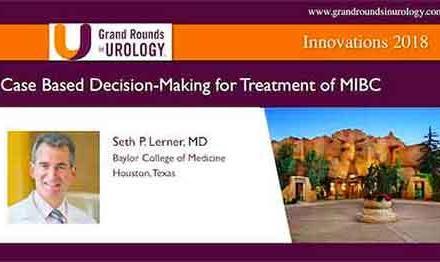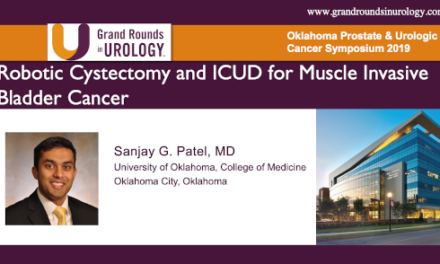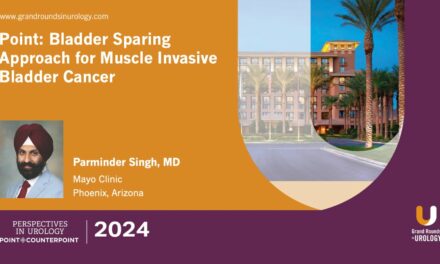Frances M. Alba, MD, presented “Recurrent T1HG Bladder cancer after BCG: More Intravesical Therapy or Radical Cystectomy” at the 28th Annual Innovations in Urologic Practice conference on September 20, 2024.
How to cite: Alba, Frances M. “Recurrent T1HG Bladder cancer after BCG: More Intravesical Therapy or Radical Cystectomy.” September 2024. Accessed Nov 2025. https://recurrent-t1hg-bladder-cancer-after-bcg-more-intravesical-therapy-or-radical-cystectomy/
Recurrent T1HG Bladder cancer after BCG: More Intravesical Therapy or Radical Cystectomy – Summary
Frances M. Alba, MD, discusses the management of T1 high-grade bladder cancer, focusing on cases that recur following BCG therapy.
In this 14-minute talk, Dr. Alba introduces the case of a 53-year-old male with T1 high-grade bladder cancer who underwent a complete six-week BCG course but experienced recurrence within ten weeks. Dr. Alba notes that BCG failure is not uncommon, with the term “BCG unresponsive” now used to describe persistent or recurrent disease within defined timeframes after adequate BCG treatment. In these patients, continued BCG is seldom effective.
Alba highlights the AUA guidelines for these patients, recommending cystectomy as the best chance to prevent disease progression. Despite its efficacy, only a quarter of urologists in the US recommend cystectomy for BCG-unresponsive cases, with many preferring intravesical chemotherapy. Gemcitabine-docetaxel combination therapy shows promise. Alba also shares additional options, such as nadofaragine, pembrolizumab, and novel therapies, including N-803.
About The 28th Annual Innovations in Urologic Practice:
Presented by co-chairs Mohit Khera, MD, MBA, MPH, and Michael Coburn, MD, FACS, the Innovations in Urologic Practice conference provides a detailed review and commentary on multiple genitourinary and urologic diseases. Among the featured oncological topics are bladder cancer and immunotherapies, as well as upper tract cancer management, prostate cancer, including state-of-the-art imaging, focal therapy, and MRI. Experts also discuss new tools and techniques for nephrectomy and treating advanced renal cell carcinoma. In terms of general urological approaches, the conference also includes pelvic reconstruction and trauma; men’s health topics like male infertility, andrology, and sexual dysfunction; OAB and voiding dysfunctions; and ways to diagnose and treat infections in the urology patient.
For further educational activities from this conference, visit our collection page.
ABOUT THE AUTHOR
Frances M. Alba, MD, is an Associate Professor for the Division of Urology and the Director of the Urology Program at the University of New Mexico in Albuquerque. Dr. Alba’s clinical interests encompass all aspects of general urology, with a particular expertise in bladder, kidney, and testis cancer.





